- Home
- Sarah Hall
The Beautiful Indifference Page 2
The Beautiful Indifference Read online
Page 2
I was fascinated to see the parents together. My mother had died when I was eight and my dad never had another woman in his life, so it was an unusual thing, adult intimacy. There was something out of balance in the cottage where I lived, something steeply slanted. My dad had more heaviness to him than in just his arms and legs and the big belly where he rested his glass after dinner. But he was light compared to my mother’s leftovers; her wardrobe of sour-smelling clothes, the elasticated jam-jars and dusty talcums. When I lay in bed at night and heard him grizzling I could feel the building pitch, trying to upend itself, and I’d brace my feet against the bottom of the bed.
The Slessors were even-weighted and indestructible. They’d paired by feral instinct, like wolves among us. If either of them stepped outside the marriage to a different bed – and there were those who gossiped about Geordie’s liking for young stable hands, his chance bairns – then it did not threaten the union. They had produced between them three boys and a girl, all fit, all feisty. And there was a sense there might have been more, they had it in them still, he at almost seventy, she at almost fifty. The children bound them, but the two had bindings before, and bindings after. They belonged in the pairing. Even when you saw them singly in the house or around town you knew there must be another half, a mate. Neither went into it for money, for when they began courting there was none. Vivian had owned one dress that would serve for the wedding. All Geordie had possessed were a few tons of salvaged pipe and lead shingle.
For all his anger and brash, I never saw him raise a hand to his wife. He could have tried to brutalise her, the way he rode roughshod over everything else in life until it obeyed or broke. But he adored her, this rectifying woman. And he would, in any case, have met his match. He knew it. And, moreover, she knew it. If the man feared anything, it was his wife’s genes, her cuntish atoms. I used to watch as she diced up chicken – the knife would slice and slice, clear of her fingertips, but she’d be watching him as he poured his Scotch. Though he’d likely never been near a history book in his life, it was as if Geordie Slessor knew the old region’s legacy of women riding alongside men up to the Border, their babies twined across their backs in sacking. She would have taken those fists into her soft flesh, and even worn his black temper on her face in public for a while. Then in the night she would have slit him wide open, balls to bellybutton. She would’ve stemmed the blood with secret plant medicine, a draught to make the red come slower, and given him the guttings of his prize colt in exchange for his own liver. Or she’d have granted him something from her domestic realm of keeping the big house; a dinner of ground glass, meat frozen and thawed repeatedly, bannock of foxglove.
She was a handsome woman. Her brow was cross-hatched, but lively. Years before she’d had gorgeous tumbling locks, brown and gleaming in their wedding photographs. Perhaps it had thinned or greyed, for she now wore the unwilling bob of a woman proud for most of her life of her hair’s beauty, and she’d still sweep it back, invisibly, off her shoulders. Manda got her full chest from her mam. Vivian was voluptuous, but bone-sculpted at her collar and her jaw. Men opened doors for her. And it was obvious when Geordie wanted her, for he made no game of it, he did not care who witnessed his desire. He’d come at her and grasp her waist. He might even have lifted up her skirts were she not to take it upon herself at these moments to move them both into a private space. Even then their sounds could be heard. After they were done they’d come back into the room easily, unashamed. Everyone knew when they were at it – High Setterah took on a different atmosphere. The smell of the horse sweat grew gamier. The boys became edgy and would take to drinking or baiting the dogs. Manda turned up the stereo.
But it was their tender moments that intrigued me most, the brisk expressions of what I took to be love, that would have been mistaken for ordinary occurrences or arguments by anyone not watching them as hard as I watched. Him pulling a spelk out of her hand, pinning her to the table with an elbow and twisting her arm behind her so she couldn’t pull away while he doctored her. Him shouting at her from the car window for walking behind a reversing trailer.
Blind bloody bint! he spluttered. But it was panic in his voice, not anger.
And I saw her take out her husband’s cock and hold it when he came home so drunk from the rugby club that he started to piss himself in the porch of High Setterah.
Of the two of them I preferred her, and this surprised me because women could make me uncomfortable and I didn’t know what to talk to them about. But I would have eaten out of her hand without much fuss. Geordie, in a good mood, would flirt with me, and that I could take as acceptance of a kind, mortifying though it was.
Look at the lass, she’s full up, is she not, he’d say, when Manda and I dressed to go out on a Friday night. Vivian often said nothing when I was in the room, but she’d sing songs with my name in.
Maybe I’ll go down and see Kathleen,
A swallow comes and tells me of her dreams.
Soon I’m gonna see my sweet Kathleen.
Mostly when we went out it was around town, between the pubs, wherever Manda thought she might catch sight of a lad she was interested in. Sometimes, if one of her brothers didn’t mind us coming with him on a delivery or to a gig, we went to the city of Carlisle. It was always a mad trip up, with stupid steering and breakneck overtaking, because the lads loved speed. They loved it on horseback, motorbikes, skis; any vehicle they could make accelerate to flatten their brains against their skulls.
There were two main roads from town – the old toll road, and the Roman, which was nearly disused and cut past the wither of Lazonby Fell. And there was the M6. It was a deserted piece of motorway – the last run before Scotland, so it felt like everything was petering out.
I’d sit rammed up against the window, my cheek pressed coldly against it, holding the seatbelt tight across my chest. Manda fought for control of the radio dials while one of her brothers drove. Usually it was Aaron, who would shoot the cambers as if he was on a private racetrack. We crossed that hinterland as people still do now, and they always have done, and they likely always will, regardless of police traps and cameras – moving flat out, at reckless speeds, as if being pursued.
I hated all the passages up to the city; that eerie twenty-five-minute slew. Something always seemed to be at our backs along there. These were the original badlands you were taught in school, if you didn’t already know. You wouldn’t want to linger. You wouldn’t want to be caught alone, moving slow and obvious in the lowland. This was where the raiders met, coming south or north. This was burnt-farm, red-river, raping territory. A landscape of torn skirts and hacked throats, where roofs were oiled and fired, and haylofts were used to kipper children. And if you rolled down the window you could just about hear it – the alarms and crackling flames, women split open and screaming as their menfolk choked on sinew pushed down their gullets. The houses in the Borders, if they weren’t fortified, were temporary, made of spit and cattle shit and wattle, easy to dismantle, because when the reivers came you either held fast behind eight hewn feet of rock, or you packed up and ran.
The van leaned hard round chicanes, forcing my cheekbone harder to the glass, with Aaron singing away to the Roses. Manda seemed fearless on the ride. She seemed to trust the run of things. But I imagined terrible events – wrecks and busted spleens. Adrenalin cleaved my brain wide open, and the giversum old county clambered in. It was said by trainers that up here the gentlest horse could nostril the smoulder of years gone by, taste clinker and burnt skin on the haunted vaults, and it might rear and toss its rider. And for all the Roman straightness, cars would often overturn. There were countless places where wreaths were laid. Even my dad, usually sedate behind the wheel, leaned hard on the accelerator with his mucky welly through these stretches, not checking the rear-view mirror. He’d fail to indicate when moving lanes; swerve hard as the Land Rover was swiped by gusts from the Pennines. Long-distance drivers, returning home to London and Birmingham, Stafford and Manchester,
would often find franked letters from the Cumbrian Police, with points for their licence and a hefty fine, and they couldn’t quite fathom why they were clocked going over ninety.
On several occasions Aaron Slessor almost killed us driving to Carlisle, and on every one I hated him a bit more. He kept the music loud and ignored us, except for the odd glance at my legs now and then. He went after hares on the tarmac, terrorised other motorists by sitting on their bumper until they moved out of his way. He’d take the back road along the moors, by the Caldew river, brackish as old copper, because it was straight and hummocked and he could try to get all four wheels of the van off the ground. He dropped me home late after each trip, where my dad would be asleep on the sofa with the telly turned low. Aaron didn’t complain about ferrying me to and fro, he seemed just to like the drive, the fords and hairpins through the villages. Once or twice he’d ask for a kiss as I was getting out and I’d shove him back and say get lost.
You’re pretty enough to lick out, he’d say. Stop being spooky.
At nineteen he was the youngest of the Slessor lads, and he’d an almighty chip on his shoulder about that, a desire to be the belted champion in the family. Geordie never got weak enough in his later years not to batter him. If anything he brayed him all the harder – the old family bull recognising his fighting days were close to over. That his youngest son took less interest in the horses than the others, while driving the Heltondales tighter on each racecourse’s slalom, riled him no end.
Gudfernobbut twat, he called his son. Runty mutt. You’ll amount to fuck all in this life, except laying rugs round fucking bogs.
Amateur brawlers from the town sought Aaron out, because it was said that to beat him in a fight was to take title over the town. He’d left school not a day after hitching sixteen, and started work at the carpet outlet. He was a looker, with the royal swagger of his old man. I’d seen him go to work on a lass. He had the ability to cut through what little pride she had, to strip her of common sense and condition her to waiting by the phone, waiting outside a pub in the rain, waiting for the characteristic bastard’s alba a few weeks later when he’d got bored – telling her she had a dry quim, old biddy skin, fat belly, or spots on her arse, and that’s why he no longer fancied her.
Nor was he discreet about his conquests. The details of them – the gasps, the games and sexual proclivities – were the chatter of the town for weeks after. How it had been in a horse-trailer and she’d knelt in fresh shit to suck him off. How he’d had her right after her sister in the same evening, a double-dipper. So that his circle of friends had the knowledge of any of his exes they needed before asking them out. And Aaron would occasionally revisit them, Friday nights, if something interested him enough in a bare leg or split skirt, a new look, a haircut. And they’d let him.
It wasn’t common that I stayed home. They liked company, the Slessors. They liked having noise and new faces about them. I never felt unwelcome. But the summer after I got to know Manda my father started to notice me being gone. And he said it was a shame, him losing my mam and now me. The guilt made me hang around for most of the holidays, even though he was out rounding and clipping all day, the house was too chill for the season and it made me fidgety. In the mornings I’d phone up Manda, or she’d phone me.
Oh bugger, Kathleen, can’t you come in? she’d say. I’m lonely. I’m going to get some new lippy. Fine, alright, ta-rah.
Then I’d go walking along a scrubby lonning in the village and up the Scar, knowing she’d soon be off into town, having a good time with someone else. From the summit I could see the beacon in the distance, trains dribbling down the main line, and the ponds of the trout fishery glimmering. On the way home I’d pass by a dilapidated farm, littered with rusting metal-seated tractors, derricks and machinery, tarpaulin strewn about in the yard. The owner of the place was a rare bastard. He could be heard in the evening yelling obscenities at his dogs and throwing their bowls at them. There’d be howls and yips and yelps. He had any number of hounds and collies, all rangy and greasy, and half-mad with the frustration you see in workers not put to the flocks.
The farm lay just past a dolt of brambles; I’d pass it after coming through the thorny lane, unsnagging my jeans with a twist of the hips every other step, my arms held overhead. It smelled of Swarfega and slurry, dirt and iron, and something sick, like industry and arable wrongly mixed. The man was known in our village for his bad treatment of animals, though he didn’t keep many past the dogs, a handful of bantams, and the occasional pony or scabby penned-in pig. No one reported him to the RSPCA, for doubtless then they’d have to look into their own barns.
But one morning, near the holiday’s end, I was walking past the farm’s corrugated shed and I noticed the door was open. Usually it was shut and chained, with a thick trestle leaning against it. A dead horse was lying on the ground between the metal cattle chocks. The ground was slick yellow-brown, like concrete covered in piss and diarrhoea. I stepped closer, in under the gable, and a stink rose.
A shaft of sunlight lit the horse’s body. The thing was a mess, shorn of its coat, with sores under its legs and keds crawling all over it. Its ribcage angled up through its flesh like the frame of a boat being dismantled. It had not stood for a long time for its hooves had twisted into thick discoloured spirals, like the nails of a Chinese emperor. For a moment I stood, stupidly looking at the creature. My brain began to flurry. It had not stood for a long time. It had lived on the floor; its hooves not wearing down from grazing and cantering like a properly upright creature. It had lived as it starved.
I took another step in and the horse snorted and moved. It lifted its head and rump together, tamping its torso down on the ground as if meaning to get up, and as it struggled its hooves clicked together and scraped on the floor like flints. It snorted out a pink foam that was lathered in its nostrils, and dragged its back legs again. Click-click. Then it was still.
I cast my eyes around for a pot of water, a blanket, some feed, and saw nothing of any use or comfort. I knew the farmer might be in the bothy, or bent in a shadow nearby, for the shed door would not have been open otherwise, but I couldn’t see him. The horse lay unmoving again, as good as gone.
It’s alright, girl, I whispered, to myself, or to the animal, I wasn’t sure which.
Then I walked away. And then I ran.
With every stride, gall rose in me against the man. A dead horse I could have taken. I’d seen much worse – lambs stumbling on the howse, their eyes and arseholes pecked out by the crows; hinds and heads stacked up inside the abattoir. A dead horse was not a problem. But I couldn’t stomach a foully living one. My heart harried my blood as I ran. I pulled myself on through the blackthorn, tearing my arms off the burrs without untangling them. My mouth seemed filled with salt and seeds and pellets, though I tried again and again to spit them out along the path.
This farmer had driven one wife to alcohol, Valium and public breakdowns, and finally a bathtub overdose, it was said. The second had died after falling into the silo. Neglect. Suicide, maybe. But a patient killing in a reeking shed? No. A wife could up and walk away. She wasn’t starved. Her feet weren’t bound. This rotted, lying-down horse was worse than anything I’d known. It was something from a middle-forest fairytale, where the dark branches lift and in a clearing is Knife-Hand Nick, his children’s heads bubbling in a pot above the fire. It was like meeting Nelly Wood in your dreams, when she stitches your skin to the hem of her cloak and flies away, dragging your pelt behind her, so in the morning you wake up flayed.
I stopped in the briar and leaned over and was sick.
By the time I got back to the village I was patch-worked with bramble gashes, and blood was dripping off my elbows. In my head I could still hear the skeltering hooves, scraping and clicking and scraping on the ground. I thought I’d go to the top field and tell my dad to fetch the vet. I thought I’d go into the house, take the shotgun from its rack above the mantel and kill the horse myself, or kill the man, or kil
l them both. But, like a reprieve, the blue Slessor van was parked outside the Fox and Pheasant, by the village green, and I saw Aaron climbing back inside from a delivery, or a pint, whatever reason he’d been there. He rolled the window down as I walked up.
Now then, Kathleen. What have you done to yourself, you daft tuss? he asked, looking me over.
Nothing. Just come with me, will you? I said, and he laughed.
Aye, aye.
It’s not a joke, Aaron. Come with me now.
He tucked his bottom lip under his teeth and had me stand there against the blue bore of his eyes. Then he opened the door and climbed down out of the van. Maybe he came for curiosity about the blood on my arms, already drying in black gobs from the summer heat. Or for the chance his sister’s friend would let him move her knickers to one side, like he’d been after for weeks. Or maybe it was my tone, the bite of it, for I’d never spoken so assuredly to him before. Any other day I’d have been ignored, or he’d have flustered me with a tease. But he followed me through the ginnel, calling me a dippy bint, complaining he’d torn his shirt on the briar, and saying it better be worth it.

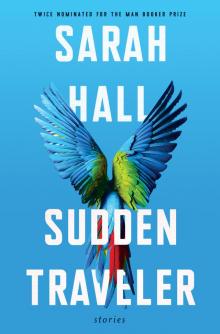 Sudden Traveler
Sudden Traveler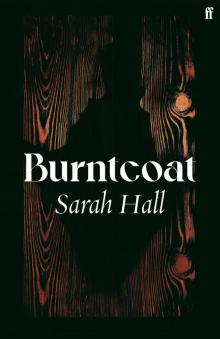 Burntcoat
Burntcoat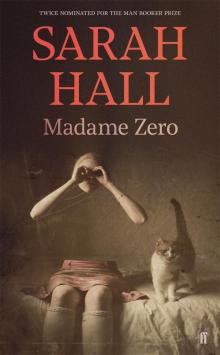 Madame Zero
Madame Zero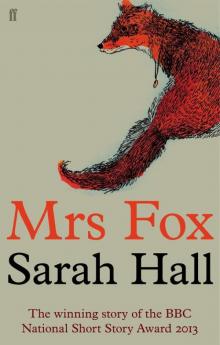 Mrs Fox
Mrs Fox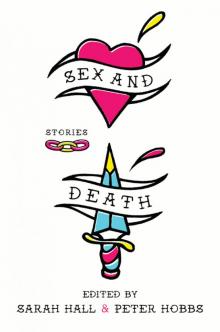 Sex and Death
Sex and Death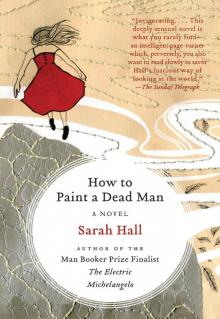 How to Paint a Dead Man
How to Paint a Dead Man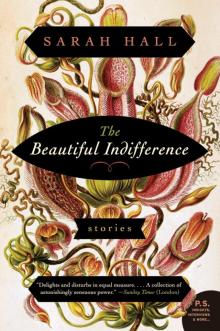 The Beautiful Indifference
The Beautiful Indifference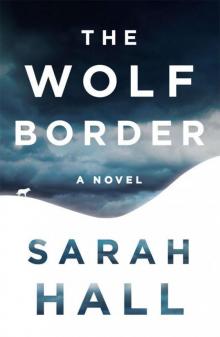 The Wolf Border
The Wolf Border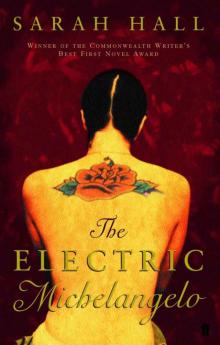 The Electric Michelangelo
The Electric Michelangelo